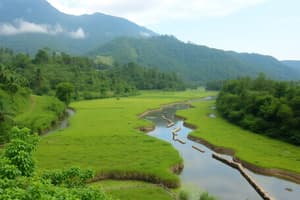Podcast
Questions and Answers
What is habitat restoration and how does it benefit ecosystems?
What is habitat restoration and how does it benefit ecosystems?
Habitat restoration involves the reestablishment of natural ecosystems to improve their health and function. It benefits ecosystems by improving habitat quality, supporting biodiversity, and restoring ecological balance.
Explain the concept of species reintroduction and its significance in ecosystem conservation.
Explain the concept of species reintroduction and its significance in ecosystem conservation.
Species reintroduction is the release of a species into an area where it once lived but has since become extinct or endangered. It is significant in ecosystem conservation as it helps restore ecological balance and stabilize ecosystems.
Describe sustainable management practices in ecosystems and provide an example of such a practice.
Describe sustainable management practices in ecosystems and provide an example of such a practice.
Sustainable management practices in ecosystems involve the use of renewable resources and environmentally friendly practices. An example is agroforestry, which integrates crops and trees on the same land to improve soil health, increase biodiversity, and reduce the need for synthetic fertilizers.
What are provisioning services in ecosystems and provide examples of such services?
What are provisioning services in ecosystems and provide examples of such services?
Explain the importance of cultural services provided by ecosystems and give examples of such services.
Explain the importance of cultural services provided by ecosystems and give examples of such services.
Flashcards are hidden until you start studying
Study Notes
Ecosystems: Understanding Their Dynamics and Human Influence
Ecosystems are complex, interconnected systems that support a diverse array of living organisms, including plants, animals, fungi, and microbes. These networks of interactions provide essential services that sustain life on Earth, such as producing oxygen, regulating climate, and recycling nutrients. In this exploration of ecosystems, we'll delve into the human impact, conservation efforts, and the valuable services they provide.
Human Impact on Ecosystems
Humans have had a profound effect on ecosystems, particularly in recent centuries. The growth of human populations and industrialization have resulted in habitat destruction, pollution, climate change, and the overexploitation of natural resources. These pressures have led to the extinction or endangerment of many species and a decline in overall ecosystem health.
Some examples of human impacts include the conversion of forests into agricultural land, the release of greenhouse gases and pollutants into the atmosphere, and the overfishing of marine ecosystems. These practices can lead to increased erosion, water pollution, and species loss.
Conservation Efforts in Ecosystems
Conservation efforts aim to protect and restore ecosystems and the species they contain. These efforts can take various forms, including habitat restoration, species reintroduction, and sustainable management practices.
Habitat restoration involves the reestablishment of natural ecosystems to improve the health and function of the habitat. For example, riparian buffer strips can be planted along waterways to reduce erosion, improve water quality, and provide habitat for aquatic species.
Species reintroduction involves the release of a species into an area where it once lived, but has since become extinct or endangered. This practice can help to restore ecological balance and stabilize the ecosystem.
Sustainable management practices include the use of renewable resources and the adoption of environmentally friendly practices. For example, agroforestry involves the integration of crops and trees on the same land, which can improve soil health, increase biodiversity, and reduce the need for synthetic fertilizers.
Ecosystem Services
Ecosystem services are the benefits that human societies derive from ecosystems. These services can be broadly categorized into four types:
- Provisioning services: These are the products that ecosystems provide, such as food, water, timber, and fiber.
- Regulating services: These are the processes that ecosystems perform, such as climate regulation, water purification, and disease control.
- Supporting services: These are the conditions that ecosystems provide, such as soil formation, nutrient cycling, and habitat provision.
- Cultural services: These are the non-material benefits that ecosystems provide, such as recreational opportunities, spiritual and aesthetic values, and cultural identity.
Understanding the ecosystem services that human societies rely upon can help to inform conservation efforts and promote sustainable development. By recognizing the value of ecosystems, we can work to protect and restore these vital systems for the benefit of current and future generations.
In conclusion, ecosystems are complex networks of interactions that support a diverse array of living organisms. Human activities have had a profound impact on ecosystems, leading to habitat destruction, pollution, and species loss. Conservation efforts aim to protect and restore ecosystems and the species they contain, while also recognizing the valuable services that ecosystems provide to human societies. By understanding these complex systems, we can work to protect and sustain them for the benefit of current and future generations.
Studying That Suits You
Use AI to generate personalized quizzes and flashcards to suit your learning preferences.




